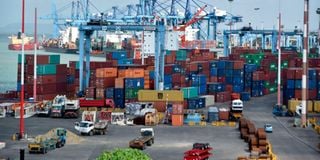Premium
Stakes high as port privatisation bid kicks off

Kenya Ports Authority (KPA) Yard in Mombasa.
President William Ruto's administration has initiated plans to lease some key Kenya Ports Authority (KPA) assets, setting stage for more private firms and individuals to directly benefit from the multi-billion State agency.
President Ruto-led Kenya Kwanza Alliance seems to have changed tune as it had initially opposed a similar plan that had been mooted by the previous administration of Uhuru Kenyatta. Then, his team claimed that the selected infrastructural assets had been secretly sold to Dubai Port World FZE.
On Monday, KPA Managing Director William Ruto placed bids for the operations and management of critical port facilities at Mombasa and Lamu port.
The facilities to be placed under private firms’ management are Lamu Container Terminal berth 1-3, Lamu Special economic Zone, Mombasa Port’s berth 11-14 and Mombasa port container Terminal 1.
“KPA invites sealed bids from eligible tenders for consultation of bidders to development and operation of port assets through PPP. Completed bids shall be submitted by October 12, 2023,” read the call.
Also read: Privatisation is killing KPA softly
According to KPA, bidders from private institutions are invited to bid either as individual company or through Joint Venture.
“If a private is a party is a Joint Venture (JV) the full name of the JV shall be used and all members starting with the name of the lead member,” said KPA.
Kenya Kwanza government is taking advantage of Merchant Shipping Act amendment which ealier barred shipping lines from operating port facilities.
The Act was amended in 2019 and gave the Transport Cabinet Secretary powers to exempt government-owned companies from the requirement.
Before, there had been concerns about private-owned firms operating KPA facilities, with players citing the fact that it may dent KPA’s revenues.
The announcement has therefore raised mixed feeling within port stakeholders with some questioning the process, considering that the parastatal has remained the only government institution raking in huge profits.
In the last financial year, the agency recorded more than Sh15 billion in profits.
“We are waiting to see the miracle behind it considering previous government institutions which were privatized have never recovered but if well managed, it will bring in efficiency,” said Shippers Council of Eastern Africa (SCEA), chief executive Gilbert Langat.
Millers Association’s port representative Salim Naseeb Mbarak on the other hand opposed the privatisation saying not much will be achieved.
"We have questioned reason of inefficiency and we are asking for improved services since we are not for the privatisation of Mombasa port which is profit making. We need to see improved efficiency at Mombasa port just like other world class ports," said Mr Mbarak.
Kenya International & Warehousing Association (Kifwa) National Chairman Roy Mwanthi on his part said privatizing Lamu port was a good idea but remained doubtful over what private company will do to make Mombasa port more vibrant.
“Bringing a private investor in Lamu port is welcomed since the facility has been idle for many years and is key to the government. The move is one way to make the project not turn to be white elephant,” said Mr Mwanthi.
More than two years after Lamu Port was operationalized, Kenya has not benefitted from it for failing to attract business thus leaving infrastructure worth billions of shillings under-utilized.
To save the situation, President Ruto in June announced that the government will place bids to attract best private companies to run the facility.
During the President’s tour in Coast region last week, he announced plans to seek partnership under PPP to run Lamu port and equip key scanners at the port of Mombasa to improve two key country’s commercial ports.
According to President Ruto, the ports are confronted with the challenge of congestion and, therefore, higher dwell times for cargo thus he called for the lease or concession to private operators with landlord-type port management system.
Even as the bids are placed, already, the government has been courting Dubai and Saudi Arabia multinational logistic companies for a possible investment at the Lamu Port.
The concessions once signed, could give DP World operating concessions at Kenya’s major ports, including Mombasa, Lamu and Kisumu.
At Mombasa Port, DP World is to be allocated four berths which currently are unable to handle container operations.
Under the proposal, DP World would turn them into a modern multipurpose terminal capable of handling one million TEU.
At Lamu Port, DP World was set to operate three berths and develop a 500-hectare parcel into a special economic zone, mainly focused on agricultural activity and servicing the Lamu corridor (the highway that connects the port to Ethiopia and South Sudan).
President Ruto said has since maintained that his administration plans to privatise between 6 and 10 government-owned firms over the next year and the list of targeted entities includes Kenya Ports Authority (KPA), which operates Mombasa Port.
DP World has been in an overdrive to acquire Indian Ocean ports and with its presence in Kenya and Tanzania, it will company’s reach on the east African coast, where it already has interests in nations including in Somalia, Eritrea, Djibouti and Mozambique.





